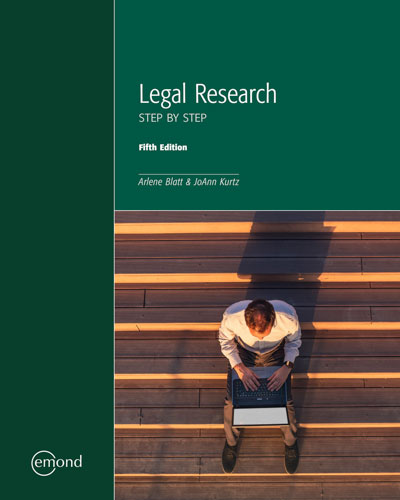

This page contains a list of key databases and finding tools that can help you locate Canadian case law, legislation, and secondary sources about Canadian law. A list of guides on how to conduct Canadian legal research is also provided.
On this page:
If you are unfamiliar with the process of conducting Canadian legal research, or if you just need a refresher, we recommend consulting one of the guides listed below.
 Legal Research Manual
by
Lederman Law Library
Guide to all aspects of the legal research process, with a focus on the resources available through Lederman Law Library. Created by law library staff, with our students in mind.
Legal Research Manual
by
Lederman Law Library
Guide to all aspects of the legal research process, with a focus on the resources available through Lederman Law Library. Created by law library staff, with our students in mind.
 Legal Research: Step-by-Step, 5th ed
by
Arlene Blatt and JoAnn Kurtz
Legal Research: Step by Step, 5th Edition provides legal students with the foundational support they need to learn how to effectively conduct legal research. Through its guided text format, this bestseller walks readers through research methods and resources using clear language, key terms, image captures, charts, diagrams, and exercises—ideal for students with little or no experience with legal research.
Legal Research: Step-by-Step, 5th ed
by
Arlene Blatt and JoAnn Kurtz
Legal Research: Step by Step, 5th Edition provides legal students with the foundational support they need to learn how to effectively conduct legal research. Through its guided text format, this bestseller walks readers through research methods and resources using clear language, key terms, image captures, charts, diagrams, and exercises—ideal for students with little or no experience with legal research.
 The Practical Guide to Canadian Legal Research
by
Nancy McCormack, John Papadopoulos & Catherine Cotter
The Practical Guide to Canadian Legal Research
by
Nancy McCormack, John Papadopoulos & Catherine Cotter
When conducting legal research, it is usually best to begin with a secondary source such as a legal textbook, treatise, or legal encyclopedia. Secondary sources can provide either brief summaries or detailed explanations and analysis of the law, depending on the type of source consulted. They also save you time by pointing to leading cases and important pieces of legislation on a topic.
The law library at Queen's gives you access to an abundance of secondary sources online and in print. This section lists the key finding tools that you can use to locate relevant secondary sources on your topic.
The online subject guides created by the law librarians at Queen's are an excellent way to quickly identify the most current and authoritative books and ebooks on a wide range of legal topics, which are available through Queen's Library. There are over thirty legal subject guides on topics ranging from Aboriginal Law to Wills, Trusts & Estates Law.
Click here to see a full list of law subject guides.
Omni is our easy-to-use academic search tool that gives you access to high-quality resources from Queen's and 17 other Ontario university libraries. Omni contains records for books and e-books, journal articles, government documents, and much more.
The video located below provides helpful tips on how to search for secondary legal sources in Omni.
The following databases can be used to locate Canadian case law and legislation.